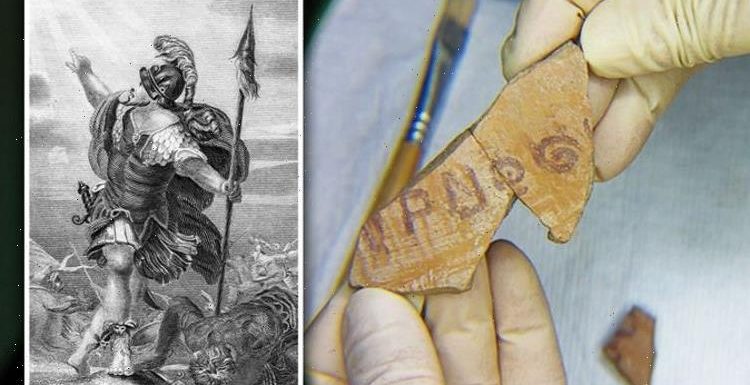
Jerusalem: Archaeologists find ‘rare’ 2000 year old stone table
We use your sign-up to provide content in ways you’ve consented to and to improve our understanding of you. This may include adverts from us and 3rd parties based on our understanding. You can unsubscribe at any time. More info
The “rare inscription” has been dated to about 1100 BC after it was uncovered during archaeological excavations south of Tel Aviv. The word “Yerubaal” was penned in ink as a sign of ownership on a small jug that may have once held perfume, oil or medicine. More importantly, however, Yerubaal or Jerubaal is a name that appears prominently in the Old Testament’s Book of Judges.
According to the biblical tradition, Jerubaal was a nickname given to the Jewish military leader, Gideon ben Yoash (Gideon son of Yoash/Joash).
Scripture describes Gideon as a military mastermind, prophet and judge who led a host of 300 Israelites in battle over the Midianites.
Judges 6, for instance, reads: “The angel of the Lord came and sat down under the oak in Ophrah that belonged to Joash the Abiezrite, where his son Gideon was threshing wheat in a winepress to keep it from the Midianites.
“When the angel of the Lord appeared to Gideon, he said, ‘The Lord is with you, mighty warrior.'”


The ancient piece of pottery was found at the archaeological site of Horbat al-Ra’i or Khirbat er-Ra‘i, near Kiryat Gat.
The inscription was then deciphered by an expert at George Washington University, in the US.
The preserved letters show “yod, resh, bet, ayin, lamed” and signs of other letters that have been lost to time.
There is, of course, no real guarantee the ceramic jug ever belonged to the biblical hero.
But the Israel Antiquities Authority (IAA) said it is a tantalising possibility considering this is the first time the name Jerubaal has been found outside of the biblical record.
The group announced on Facebook: “Inscriptions from the biblical period are extremely rare – and to date, only a handful include more than several unrelated letters.
“This discovery is the first time that the name Jerubaal has appeared in an archaeological context dated to the period of the Judges, around 1110 BC.

“Moreover, the Yarubaal inscription contributes greatly to our understanding of how the alphabetic script spread during the transition from the Canaanite to the Israelite period.”
The period of Judges relates to the 12 biblical judges described in the Hebrew Bible and Old Testament.
These individuals were prominent leaders and chieftains who led the Israelite tribes before an Israelite monarchy was established.
The 12 judges were Othniel, Ehud, Shamgar, Deborah, Gideon, Tola, Jair, Jephthah, Ibzan, Elon, Abdon and Samson.
Gideon is most famous for fighting the rise of idolatry and cutting down an altar dedicated to the Canaanite deity, Baal.
According to excavation leaders Professor Yossef Garfinkel and Sa‘ar Ganor, the name Jerubbaal was fairly common in the time of the Bible’s Judges.
But the experts have not entirely ruled out the biblical connection just yet.


They said: “According to the Bible, Gideon organized a small army of 300 soldiers and attacked the Midianites by night near Ma‘ayan Harod.
“In view of the geographical distance between the Shephelah and the Jezreel Valley, this inscription may refer to another Jerubbaal and not the Gideon of biblical tradition, although the possibility cannot be ruled out that the jug belonged to the judge Gideon.
“In any event, the name Jerubbaal was evidently in common usage at the time of the Biblical Judges.”
The experts added there is a great debate among scholars and historians over whether the biblical record is accurate.
In particular, evidence of the events and heroes of the Old Testament is rarely found in the archaeological record.
But there have been some prominent discoveries in recent years that have shed some light on this fabled period.
According to one scripture expert, a 2,800-year-old inscription found in Jordan proves the existence of the Old Testament prophet Balaam.
In another case, an expert has claimed archaeologists have found a seal belonging to the biblical prophet Jeremiah.
Whatever the case may be, the archaeologists said: “The name Jerubbaal only appears in the Bible in the period of the Judges, yet now it has also been discovered in an archaeological context, in a stratum dating from this period.
“In a similar manner, the name Ishbaal, which is only mentioned in the Bible during the monarchy of King David, has been found in strata dated to that period at the site of Khirbat Qeiyafa.
“The fact that identical names are mentioned in the Bible and also found in inscriptions recovered from archaeological excavations shows that memories were preserved and passed down through the generations.”
Source: Read Full Article